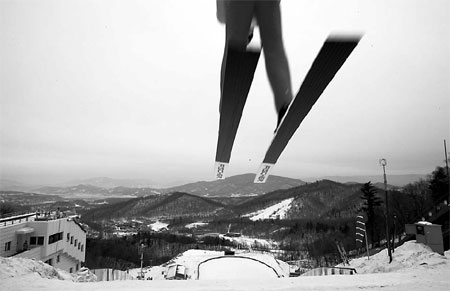While Beijing was in the heady grip of Olympic fever last August, far to the north of China the city of Harbin was busily building venues it hopes will play host to Winter Olympians in 2018.
 |
|
A ski jumper practices at Yabuli resort during last month's Harbin Winter Universiade. The city in northeast China invested $453.5 million in preparing for the biennial multi-sport event and has set the pace for bidding for the 2018 Winter Olympics. [China Daily] |
The city was put to the test through the 24th Winter University Games last month and it will be no surprise to anyone who witnessed what happened in Beijing that the facilities were impressive and the preparations thorough.
"The venues have been built exactly to Olympic standards so we are hoping to host a future Winter Olympics," Cao Guifeng of the organizing committee told Reuters.
"It will be a decision made by central and provincial government but we are hopeful."
Cao reflects the reserve of a Chinese official anxious not to pre-empt the decisions of her superiors. Top officials from the governing body of the Universiade were less cautious.
"They've done it well, what they have built...is really first class," Eric Saintrond, secretary general of the International University Sports Federation (FISU), told Reuters.
"It is not first class just for the Games. I believe this organizing committee is trying to host a first Winter Games here in China to bid afterwards for the Olympics of 2018."
Although China has had some success in ice sports, the lack of development of snow sports undoubtedly hurt its bid to host the 2010 Winter Games, when Harbin failed to make the short list.
Lessons were learned. The resort of Yabuli, some 200km from Harbin, was revamped and last week the first accredited Alpine skiing downhill races ever held in China kicked off the snow events at the University Games.
At Maoershan, a venue for snowboarding and biathlon has been built almost from scratch.
Artificial snow
Despite bone-chilling winter temperatures of minus 30 degrees Celsius, however, the snowfall which greeted the start of the Universiade can be a rarity in Heilongjiang province.
"Sometimes in Harbin we have no snow for the whole winter, but now we can make artificial snow using machines," said Cao, a two-time Olympian in speed skating.
After an investment of 3.1 billion yuan ($453.5 million), the only venues still needed to allow Harbin to host a Winter Olympics were a run for the bobsleigh and luge events, Cao added.
Harbin's metropolitan population of 10 million would make it by far the biggest city ever to host the Winter Games. That has its benefits in areas such as accommodation but it also has its downside.
The snow that fell during the Games could not disguise the deep scars left by heavy industry, which make Harbin the corroded buckle on China's northeastern "Rust Belt".
It has its charms, too. The kitsch of the annual Ice and Snow Festival, where huge ice sculptures tower over the Songhua river, attracts tourists from all over Asia, and the proximity of Russia gives Harbin a cosmopolitan flavor.
The influence is reflected in the architecture and red-brick Russian Orthodox churches, which sit beside the skyscrapers that dot most Chinese cities these days.
Should the bid be launched, Harbin's main Asian rival is likely to be South Korea's Pyeongchang, 850 km away as the crow flies and gearing up for a third bid after making the shortlist for both the 2010 and 2014 Games.
Olympic goodwill
China has undoubtedly garnered a great deal of goodwill in the Olympic movement.
The global economic downturn also means candidate cities for the Olympics may become thinner on the ground and analysts see the Chinese economy weathering the crisis better than most.
Despite enthusiastic support from Heilongjiang Governor Li Zhanshu, any bid for the Olympics would have to be signed off by the sports ministry.
That looks more likely now that China has decided against bidding for the 2018 or 2022 FIFA World Cup finals as officials had said they would not go for both.
"The Universiade...brings Harbin closer to the Winter Olympic Games," Xiao Tian, deputy director at the sports ministry, told Xinhua news agency.
"Harbin still has a long way to go as we have not even held an Alpine skiing World Cup event yet."
Cao said Harbin would be aiming to attract more world-class events to its new venues and wanted to help China develop more Winter Olympic medalists - most of China's top winter sports competitors come from the city.
"Our plan is quite simply to be the biggest snow and ice training center in China," said Cao.
(Agencies via China Daily March 12, 2009)